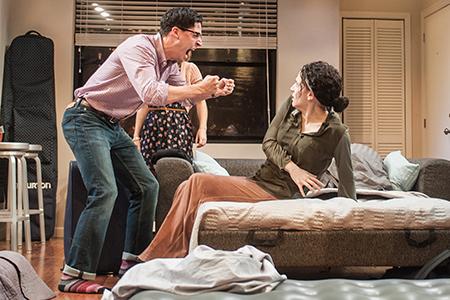‘Bad Jews’: an Engaging Clash of Verbal Abuse
By • November 17, 2014 0 1272

The thing about the bad Jews in the young playwright Joshua Harmon’s play “Bad Jews” is that they’re really baaad, as in Ming the Merciless bad.
I don’t mean to suggest that they’re evil or villains—it’s that I care not a whit and wit about how deep the wounds or that they open with their verbal assaults on each other, how much damage they do, how much blood is on the floor.
Yes, the play, now being given a blood-sharp, claustrophobic staging at Studio Theatre under the direction of Serge Seiden, and with a brilliant cast of young actors is terrifically engaging. If these guys and gals were riding a bus, they’d be thrown off, but on stage. The verbal combat they engage in is compelling: you can’t shut your eyes, you can’t close your eyes and you can’t escape. So, you might as well stay and go into shock.
Part of the fascination is that the play is very, very smartly, sharply written and is very, very funny, like a late-night set with Lenny Bruce at his most intelligently, incessantly and carelessly cruel.
The characters in the play are all Jewish, but there’s no wise men here, no cliché Jewish mothers. It’s not even “Fiddler on the Roof,” which oddly enough wrestles with some of the same core issues that lie at the heart of the scorched-earth debates in “Bad Jews.” Is being Jewish a religion or a culture? Is secular better than orthodox? Where does self-interest meet or simply bypass strict religious observance? What does it mean to be a Jew in the early part of the 21st century?
The major combatants in this close-quarter (it’s set in a cramped New York City apartment) fight are Daphna, a transformed, fierce champion of being a real Jewish woman in an increasingly secular world, and Liam (ne Schlomo), who is as cooly, briskly, smartly secular young Jewish man as you want to meet. They’re all college age—Liam and Daphna, as well as Liam’s nebbish and soft brother Jonah and Melody, the wispy, waspy, blonde girl and intended future, non-Jewish wife who was once a music major.
The occasion: it’s the day after the death of their grandfather and emotional, heritage lynchpin of the family, a Holocaust survivor who’s always been part metaphor, part beloved patriarch to the young cousins.
Liam, being stuck without a cell phone in Aspen, Colo., didn’t make it to the funeral, and instead has brought Melody along. They’re all stuck in this high-end little place Liam and Jonah’s parents have bought for just such an occasion. Daphna, who’s returned from a life-changing trip to Israel—she wants to join the Israeli army, she’s got a presumed Israeli boyfriend—comes from a less well off part of the family and is full of anger—not just about Jewish traditions or the lack thereof, but economic envy and resentment as well
In comes another complication, the real source of the battle, a fight for a “Poppy” heirloom, a life-symbol pendant or “chai” that he kept under his tongue at the concentration camp. He used it as an engagement gift in his early years, and it’s intended for that use, apparently. Now, who gets the heirloom?
Liam wants it to use to give to Melody. Daphna says she deserves it because she’s the genuine article as an observant, traditional Jew. The fight once it gets going, appears about other things too—it’s entirely likely that Daphna’s resentment of Liam hides a deep-seated crush.
The fighting words are witty, funny, viscous, to the core and heart—Daphna is all passion, but armed with a gift for crushing insults. Liam is all precision and manipulation, the rational man, who whittles away vulnerable hearts until they’re the size of a raisin.
The actors dive into this with relish—especially Irene Sofia Lucio, as Daphna with her wild hair, her breathless, wild and looping thrusts, and Alex Mendell as Liam, the cold, rational, deadly customer. Theirs is a fight that seems close to violence and possible murder. They get so close to each other at full, screaming volume that you almost plug your ears.
Maggy Erwin, who has a sweet heart as the sweetheart of Liam, has her moments. She’s both touching and funny, including in a show-stopping moment, while Joe Paulik makes the most out of his silence and physical moves as the shy pacifier, who wants nothing more than to escape the bloodletting.
It’s terrific theater—and Harmon has the gift of gab. Nevertheless, because the fighting is so horrific, you want a little more consequence, a little more what-happens-next and why. Maybe that’s impossible, given the wounds inflicted.
“Bad Jews” runs through Dec. 21 at Studio Theatre.

